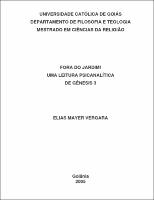| Compartilhamento |


|
Use este identificador para citar ou linkar para este item:
http://tede2.pucgoias.edu.br:8080/handle/tede/818| Tipo do documento: | Dissertação |
| Título: | FORA DO JARDIM! UMA LEITURA PSICANALÍTICA DE GÊNESIS 3 |
| Título(s) alternativo(s): | Outside the garden! A psychoanalytical reading of Genesis 3 |
| Autor: | Vergara, Elias Mayer  |
| Primeiro orientador: | Reimer, Haroldo |
| Primeiro membro da banca: | Calvani, Carlos Eduardo Brandão |
| Segundo membro da banca: | Capel, Heloisa Selma Fernandes |
| Resumo: | Gênesis 3 será tomado, aqui, como um mito hebraico que servirá para uma análise de caso, onde se busca comprovar que a psicanálise tem um olhar diferenciado para entender a polissemia existente nos mitos. Os mitos, segundo o que é aceito pela antropologia e psicologia, carregam consigo os arquétipos humanos, que, configurados por uma linguagem simbólica, abrem a sua polissemia. No mito de Gênesis 3, pecado e queda são significados resultantes de uma hermenêutica monossêmica, que tem legitimado dogmaticamente a existência do sacerdote e da Igreja que o sustenta. O elemento simbólico serpente , representativo de uma divindade, compete com a divindade Iahweh, através de um projeto transgressor, que, vitorioso, liberta os seres humanos para além do jardim. É fora desta lógica que ocorre a primeira relação sexual entre Adão e Eva, que assim degustam o prazer de se completarem, tornando-se assim também Deuses criadores. A transgressão, novo foco de sentido encontrado pela leitura polissêmica, pode fornecer a energia arquetípica necessária para a vocação profética, e para despertar o ser heróico que habita em todos os humanos. É no intervalo entre os grandes poderes que o ser humano exercita a liberdade e diviniza o seu ser. |
| Abstract: | Genesis 3 will be approached here as a Hebrew myth and will serve as a case study in which we seek to show that psychoanalysis offers a different view in the understanding of the polysemy that exists in myths. According to anthropology and psychology, myths carry the human archetypes. These are couched in symbolic language and open up the polysemy of the myths. In the myth of Genesis 3, sin and the fall are significants resultant from a monosemic hermeneutic that has dogmatically legitimated the existence of the priest and of the church. The symbolic element of the serpent representative of a divinity competes with the divinity Yahweh through a transgressive project which is victorious and liberates the human beings to go beyond the garden. It is outside of this logic that the first sexual relationship between Adam and Eve occurs. In this way they have the pleasure of completing each other and becoming creative Gods. In a new focus derived from a polissemic reading, Eve s transgression can supply the archetypal energy necessary for a prophetic vocation awakening the heroic self that exists in all mankind. It is in the interval between great powers that the human being exercises freedom and makes himself divine. |
| Palavras-chave: | Adão arquétipo Eva Gênesis 3 jornada do herói mito profecia polissemia serpente sexualidade transgressão Adam, archetype Eve Genesis 3 the hero s journey myth profhecy polysemy serpent sexuality transgression |
| Área(s) do CNPq: | CNPQ::CIENCIAS HUMANAS::TEOLOGIA |
| Idioma: | por |
| País: | BR |
| Instituição: | Pontifícia Universidade Católica de Goiás |
| Sigla da instituição: | PUC Goiás |
| Departamento: | Ciências Humanas |
| Programa: | Ciências da Religião |
| Citação: | VERGARA, Elias Mayer. Outside the garden! A psychoanalytical reading of Genesis 3. 2005. 181 f. Dissertação (Mestrado em Ciências Humanas) - Pontifícia Universidade Católica de Goiás, Goiânia, 2005. |
| Tipo de acesso: | Acesso Aberto |
| URI: | http://localhost:8080/tede/handle/tede/818 |
| Data de defesa: | 28-Fev-2005 |
| Aparece nas coleções: | Mestrado em Ciências da Religião |
Arquivos associados a este item:
| Arquivo | Descrição | Tamanho | Formato | |
|---|---|---|---|---|
| Elias Mayer Vergara.pdf | 1,54 MB | Adobe PDF |  Baixar/Abrir Pré-Visualizar |
Os itens no repositório estão protegidos por copyright, com todos os direitos reservados, salvo quando é indicado o contrário.




